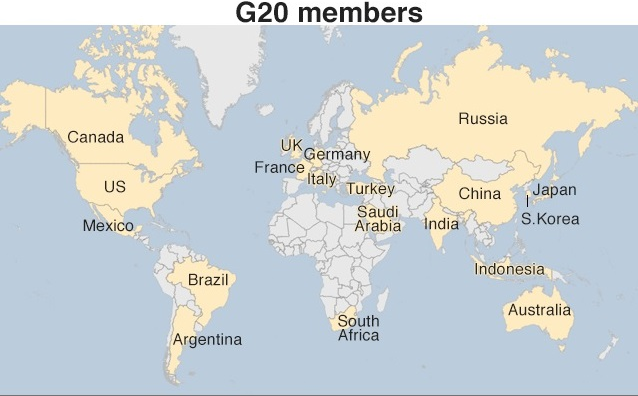Secretariat for 2023 G20 Summit | 24 Feb 2022
For Prelims: G20 and its members, Location of G20 countries.
For Mains: Importance of G20, India’s role in G20, Groupings & Agreements Involving India and/or Affecting India's Interests.
Why in News?
Recently, the Union Cabinet set in motion the process to build a Secretariat that will look after the affairs of organising the G20 summit in 2023.
- India will steer the international body as its President from 1st December 2022 to 30th November 2023, which will lead to the G20 summit to be hosted here.
- The Secretariat will be functional till February 2024. It will also enable long term capacity building, including knowledge and expertise, for India’s leadership on global issues in multilateral fora.
- Indonesia assumed the Presidency of G20 in December, 2021.
What is G20?
- It is an informal group of 19 countries and the European Union (EU), with representatives of the International Monetary Fund and the World Bank.
- It does not have a permanent secretariat or Headquarters.
- The membership comprises a mix of the world’s largest advanced and emerging economies, representing about two-thirds of the world’s population, 80% of global Gross Domestic Product (GDP), 80% of global investment and over 75% of global trade.
- Its members are Argentina, Australia, Brazil, Canada, China, France, Germany, India, Indonesia, Italy, Japan, Republic of Korea, Mexico, Russia, Saudi Arabia, South Africa, Turkey, the United Kingdom, the United States and the EU.
- Each G20 country is represented by its Sherpa, who plans, guides, implements, etc. on behalf of the leader of their respective country.
- Current Commerce and Industry Minister is the current “G20 Sherpa” of India.
How G20 Evolved?
- The Global Financial Crisis (2007-08) cemented G20’s reputation as the premier crisis management and coordination body.
- The US, which held the G20 Presidency in 2008, elevated the meeting of the Finance Ministers and Central Bank Governors to Heads of State, resulting in the first G20 Summit.
- The Summits in Washington DC, London, and Pittsburgh set the scene for some of the most durable global reforms:
- Blacklisting states in an effort to tackle tax evasion and avoidance, provisioning stricter controls on hedge funds and rating agencies, making the Financial Stability Board an effective supervisory and watchdog body for the global financial system, proposing stricter regulations for too-big-to fail banks, refraining members from imposing new barriers to trade etc.
- By the time Covid-19 struck, the G20 had wandered off from its original mission and G20 lost its focus.
- G20 reinvented itself by widening its agenda to include issues such as climate change, jobs and social security issues, inequality, agriculture, migration, corruption, terror financing, drug trafficking, food security and nutrition, disruptive technologies, and meeting the sustainable development goals.
- In recent times, G20 members have made all the right commitments after the pandemic, but there is little to show in action.
- At the Riyadh Summit in October 2020, they prioritised four things: fighting the pandemic, safeguarding the global economy, addressing international trade disruptions, and enhancing global cooperation.
- The Italian Presidency in 2021 had focused on three broad, interconnected pillars of action — People, Planet, Prosperity — vowing to take the lead in ensuring a swift international response to the pandemic.
- Despite millions of deaths, the G20 members have refused to give the legal backing to manufacture vaccines in developing countries.
What is India’s Potential for the G20 Presidency?
- As a founding member of the G20, India has used the platform to raise issues of vital importance and those that impact on the most vulnerable around the world.
- But due to the rising toll of unemployment rates and poverty in the domestic portion, it’s hard to take the lead effectively.
- India has set a strong example as the only country among G20 nations that is on track towards meeting what it had promised in 2015 Paris Agreement in terms of being the only 2 degree Celsius compatible country and is much ahead as compared to other G20 countries in terms of fulfilling this commitment.
- Concurrently, India’s leadership role in delineating the success of India-France led International Solar Alliance is globally well acclaimed as a turning point intervention in mobilising resources towards promoting research and development in renewable energy.
- Also, the vision of ‘Self Reliant India (Atmanirbhar Bharat)’ initiative is expected to play a transformational role for “New India” in the global paradigm as an important and reliable pillar of world economy and global supply chains in the aftermath of Covid -19 crisis.
- India’s endeavour of establishing the Coalition for Disaster Resilient Infrastructure, comprising nine of the G20 nations amongst others provides new dimensions of leadership in the global growth process.
Way Forward
- G20 needs leaders with impeccable global credentials. With India to assume the Presidency in 2022 it has the opportunity to restore the world's faith in multilateralism.
- The emerging economies, along with the US, must make equitable vaccine rollout and patent waiver the number one priority for G20.
- The G20 must strengthen the partnership with international organisations such as the IMF, the OECD, the WHO, the World Bank and the WTO, and delegate them the task of monitoring progress.

